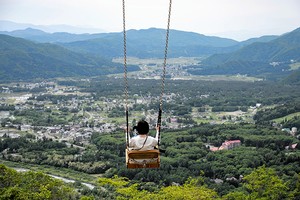By SHINYA WAKE/ Staff Writer
December 21, 2024 at 09:18 JST
After dropping out of an elite junior high school in the Tokyo metropolitan area, Keita Noda transferred to a public school but refused to attend classes.
Instead, he stayed at home and immersed himself in the world of an online video game.
This seeming lack of ambition and overall slackness could lead many teenagers to a life of unfulfilled potential and hardships.
But Noda, 17, has used his gaming expertise to set up his own company, which has drawn interest from some industry giants.
KILLING ZOMBIES AND LITTER
One day in late November at Yoyogi Park in Tokyo’s Shibuya Ward, Noda was offering advice to children wielding controllers and watching video game images flashing on screens.
The screens showed a familiar building bearing the sign “Shibuya 109” in a desolate urban landscape strewn with trash. The players killed approaching zombies using guns and chainsaws.
But if they needed stronger weapons, they had to collect empty cans, umbrellas, lunch containers and other litter from streets in the game and deliver them to an icon featuring faithful dog Hachiko.
Noda had created the Shibuya-based game. But his goal was not to help players more efficiently destroy zombies.
The purpose was to help clean up the real Shibuya area.
The event was organized by Future Design Shibuya, an affiliate of the ward that is working toward beautifying the popular tourist and shopping destination.
Shinko Osada, a director of Future Design Shibuya, has long been committed to cleanup efforts with volunteers. She decided that “people’s awareness should change” first and foremost, particularly among young individuals and foreign visitors.
Osada then came across Noda, who suggested she take advantage of a feature of the online battle royale game “Fortnite.”
In “Fortnite,” multiple players either compete or cooperate with each other to achieve a common goal. The game allows users to design their own settings for others to explore and play in.
POWER OF GAMES
With this feature, Noda reproduced the scenery of Shibuya and prepared an environment that rewards players who pick up and remove litter in their fight against zombies.
Initially, Osada did not hold high expectations, believing a “video game is just a game, and zombies are different from trash.”
To her amazement, a questionnaire survey on the children at the event revealed that at least one respondent became determined to “never litter on the street.”
“I was aware that experiences in a game can connect to reality,” Osada said. “This perspective might only be noticeable to those from the same generation as the children.”
Noda serves as president of video game planning company EbuAction, which he founded in January 2023 when he was 15 years old.
EbuAction delivers and spreads messages through engaging entertainment forms, using not only “Fortnite” but also the Roblox game sharing platform.
Noda says EbuAction’s strength lies in his creativity to “catch the hearts of people in the same age group because I have been enjoying game titles as a consumer, too.”
Noda was unable to fit in with classmates at the elite junior high school who were consumed with preparing for college entrance exams.
While enrolled at the public school, Noda started to feel uncomfortable about remaining at home, so he decided to earn a living on his own.
His business idea was to make full use of his expertise on video games to distribute digital solutions to corporations.
His know-how enabled Noda to draw inquiries from major companies, such as Matsui Securities Co., Tokyo Metro Co. and NTT Docomo Inc.
AMUSEMENT-LEARNING BALANCE
Noda emphasized that keeping a balance between amusement and didactic elements is key.
Matsui Securities, for example, asked Noda to develop a program in which players gather in-game currency and trade “kabu” shares whose prices fluctuate over time. The goal of the game is to escape a maze within a set time limit.
The real-life goal is to spread the “appeal of trading stocks.”
Players need to pay careful attention to market conditions in the game. They can intercept rivals with traps and other gimmicks, just like in other combat titles.
“I can understand that companies have messages to disseminate,” Noda said. “However, releasing content without due consideration will alienate young people, like me, from their products. We should eliminate unnecessary factors in order to transform these messages into well-balanced entertainment forms.”
For the projects with Shibuya Ward and Matsui Securities, EbuAction worked with information technology provider Transcosmos Inc.
“The move to draw on video games for ads and sales channels is spreading in the United States on a full-fledged basis,” said Jin Mitsuda, head of the metaverse promotion department at Transcosmos. “The trend will become common in Japan as well.”
A key challenge is creating apps that can appeal to young people, the main users of gaming titles.
“Frankly speaking, games whose attraction is incomprehensible have proved immensely popular at times,” Mitsuda noted.
“The only option for us is creating games while learning from members of Generation Z (born in mid-1990s-early 2010s) and (the later) Generation Alpha.”
Members of these generations have grown up with smartphones, online videos and social media. Corporations are focusing on catering to their needs because they will eventually become the leading consumer group.




















A peek through the music industry’s curtain at the producers who harnessed social media to help their idols go global.
A series based on diplomatic documents declassified by Japan’s Foreign Ministry
Here is a collection of first-hand accounts by “hibakusha” atomic bomb survivors.
Cooking experts, chefs and others involved in the field of food introduce their special recipes intertwined with their paths in life.
A series about Japanese-Americans and their memories of World War II